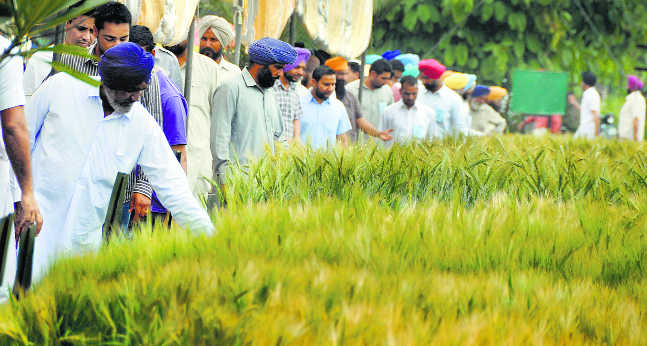
Vijay C Roy
Decreasing land holdings and dwindling incomes from conventional agriculture practices have played havoc with the lives of Punjabi farmers, especially small and marginal ones. Many of these farmers in Punjab have found a smart way to overcome the crisis.
Inspired by their brethren from western and southern states, many small and marginal farmers in Punjab have forayed into collaborative farming. Economies of scale and better returns have propelled them to venture into forming farmer producer organisations (FPOs).
Flower power Gurwinder Singh Sohi
Gurwinder Singh Sohi (39) of Nanowal village, Fatehgarh Sahib, started FPO Akal Farmer Producer Company Limited. He and other farmers jointly grow flowers like gladiolus and marigold and vegetables and sell these in nearby markets, including Chandigarh. Around 65 farmers, each having a landholding of three to five acre, jointly cultivate the fields and sell their produce. “Previously, I used to cultivate wheat and paddy on nine acres. Seeing a better future in floriculture, I motivated more farmers and diversified from the traditional crops to floriculture for economic stability,” says Gurwinder. He is cultivating on 22 acres now, nine of his own and 13 more are on lease. Out of these 22 acres, he grows gladiolas on 12 acres, both for flowers and bulbs, while five acres are under marigold cultivation. He and other farmers also grow organic vegetables.
They also grow pulses and paddy, mainly basmati varieties. Marigold can be grown both in summer and winter on as little as three acres. “As the quantity of our produce is quite good, we trade in nearby markets and decide our own price rather than relying on the middleman. This is the beauty of FPO as it empowers the farmers,” adds Sohi.
According to analysts, this is a major step towards farmer empowerment. “Through an FPO, we get credibility with people and banks. All stakeholders actively take part in this model as we are all accountable equally. This is also our first step towards marketing our own produce,” say the farmers associated with FPOs.
The bee in his bonnet Kamalvir Singh
Kamalvir Singh (36) started Nojvan Farmer Producer Company Limited for taking bee-keeping on a large scale. “I was a marginal farmer when I took up bee-keeping. It turned my fortunes. It inspired me to take apiculture to the next level and at the same time help my fellow farmers by incorporating it as an FPO. Today, more than 140 farmers with an average landholding of two to four acres are associated with the FPO and have an annual production of around 100 tonnes,” says Kamalvir. “We are in a better position to negotiate prices. For example, we command a premium of at least Rs 10-15 per kg. Besides being an FPO, we save on input costs,” he adds.
Milking the profits Puneet Singh Thind
It is beyond doubt that the farmers will be able to make a profit by making direct sales to end consumers. This will also benefit the customers and give farmers a better price, thus creating a sustainable space for agriculture.
Ambala-based Puneet Singh Thind (35) formed Ambala Farmer Producer Company Limited in 2015 and mobilised dairy farmers from around eight nearby villages to retail milk. Currently, 325 small dairy household farmers, having three to five animals and commercial dairy farmers having between 20 and 100 animals, are associated with the FPO. The combined average daily production of these farmers is 6,000 litres. The FPO supplies milk to Ambala and nearby areas in Punjab and Haryana. “By coming together our net realisation has increased significantly and we don’t have to depend on private or government milk plants for selling the produce. The formation of the FPO also helped in promoting entrepreneurship among youth,” adds Puneet.
Joint venture Hardeep Singh
In 2014, when Hardeep Singh (38), a farmer from the nondescript village Ghagga in Patiala district of Punjab, started growing organic vegetables on a 12-acre plot of land, he had high hopes. But soon he realised he needed economies of scale after some German importers approached him for a large order in 2016. Hardeep understood his shortcomings. He was not in a position to accept the export order because of his limited landholding. However, he found a solution. He incorporated an FPO in January 2017 by mobilising 63-odd small and marginal farmers, majority of them young, from nearby areas. Initially, they started cultivating organic fruits and vegetables in about 100 acres. Today the FPO, Punjab Organic Veg & Fruits Producer Company Ltd, has around 200 members and 350 acres under joint cultivation.
The members of the FPO jointly procure seeds, bio-fertilisers and machinery. It also jointly undertakes training, networking and imparts financial and technical advice to members, besides production, consolidation and aggregation, marketing and selling of the produce.
Speaking about the benefits, Hardeep says, “As all farmers associated with the FPO jointly procure seeds, bio-fertilisers, and other inputs, they are in a commanding position and have a better negotiating power. So, when they jointly procure bio-fertiliser, they are able to save nearly 25-30 per cent of their input cost. Similarly, the post-harvest cost is also less as farmers are in a better position to demand premium for their produce.” The premium varies from 40-50 per cent, and at times even 80 per cent. Hardeep’s FPO supplies organic fruits and vegetables to Delhi, Kullu and nearby areas like Patiala, Mohali, Sangrur, Bathinda, Fazilka, Karnal, Hisar, etc. “We are also planning to set up a processing unit for processing fruits and vegetables,” adds Hardeep about future plans.
What are FPOs
Farmer Producer Organisations (FPOs) are a cross between cooperative societies and private limited companies. These not only enable the farmers to get a good price for their yield but also provide an overall corporate sphere to the traditional agricultural sector in terms of modernisation, infrastructure and technology implementation.
Central incentive
Compared to the southern states, the FPOs are yet to catch the fancy of farmers in Punjab and Haryana. However, the five-year tax holiday proposed in the Union Budget for FPOs with a turnover of up to Rs 100 crore is likely to boost their incorporation in
the region. “If it is implemented successfully, the announcement will help in realising the Centre’s goal of doubling the farmers’ income by 2022,” says a senior Nabard official. Under the Produce Fund (Producers Organisation Development and Upliftment Corpus), Nabard, around 67 FPOs in Punjab are covering a gamut of activities such as agro-processing, dairy, goatery, vegetable cultivation, etc. In Haryana, there are 50 registered FPOs.
Issues before FPOs
1. Concept awareness: In North India, officers as well as farmers are not well aware of the concept of FPOs and how it is different from cooperatives, self-help groups and other kind of farmer groups. A major reason for this is the lack of cross-state exposure on such initiatives.
2. Treatment of FPOs at par with cooperatives: In Punjab and Haryana, cooperatives like Verka, Markfed and Vita are quite strong, hence terms of trade are different for both organisations. Rules have not been not updated by states to treat FPOs and cooperatives at par.
3. Incentives to FPOs: A state like Punjab lacks behind because there is no state policy and department to deal with FPOs.
4. Inefficient nodal agencies: The state-level agencies, responsible for promotion of FPOs, are not doing much.
Solutions
1. A single window system should be developed for FPO promotion.
2. State government should make schemes of model project of small-scale processing plant for FPOs with higher incentives.
3. Special focus should be given at cluster level.
4. States should support farmers groups by giving them space in market.
Who can Form FPOs
As per the concept, farmers who are the producers of agricultural products, can form groups and register themselves under the Indian Companies Act. These groups can be created at the state, cluster and village levels.
It is aimed at engaging farming companies to procure agricultural products and sell them.
Supply of inputs such as seed, fertiliser and machinery, market linkages, training and networking and financial and technical advice are also among the major activities of an FPO.



























